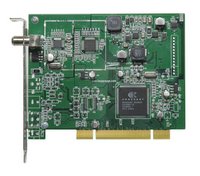Hauppauge WinTV-NOVA-SE2: Difference between revisions
m (Added component info) |
W3ird n3rd (talk | contribs) No edit summary |
||
| Line 3: | Line 3: | ||
[[Image:Nova se2 639.jpg|thumb|200px|WinTV-NOVA-SE2 Rev. 639 sold in Germany]] |
[[Image:Nova se2 639.jpg|thumb|200px|WinTV-NOVA-SE2 Rev. 639 sold in Germany]] |
||
A, so called, [[Budget]] [[DVB-S_PCI_Cards|PCI Card]] from [[Hauppauge]]. Also known as Model 639. |
A, so called, [[Budget]] [[DVB-S_PCI_Cards|DVB-S PCI Card]] from [[Hauppauge]]. Also known as Model 639. |
||
It is supported under Linux. |
It is supported under Linux. |
||
| Line 16: | Line 16: | ||
==Making it work== |
==Making it work== |
||
This card should work out-of-the-box. These instructions are obsolete for any modern distro. |
|||
Required modules and parameters: |
Required modules and parameters: |
||
| Line 187: | Line 189: | ||
==External Links== |
==External Links== |
||
* [http://www.hauppauge.de/pages/products/data_novase2.html Hauppauge Germany product page] |
* [http://www.hauppauge.de/pages/products/data_novase2.html Hauppauge Germany product page] |
||
[[Category:DVB- |
[[Category:DVB-S PCI Cards]] |
||
Revision as of 22:43, 20 September 2010
A, so called, Budget DVB-S PCI Card from Hauppauge. Also known as Model 639.
It is supported under Linux.
Overview/Features
Components Used
- Conexant CX2883 Decoder
Identification
Making it work
This card should work out-of-the-box. These instructions are obsolete for any modern distro.
Required modules and parameters:
cx88_dvb 9732 0 cx8802 9092 2 cx88_blackbird,cx88_dvb cx88_vp3054_i2c 4352 1 cx88_dvb mt352 6020 1 cx88_dvb or51132 8964 1 cx88_dvb video_buf_dvb 5124 1 cx88_dvb dvb_core 65600 1 video_buf_dvb nxt200x 11908 1 cx88_dvb cx24123 8068 1 cx88_dvb lgdt330x 7452 1 cx88_dvb cx88xx 54308 4 cx88_blackbird,cx88_dvb,cx8802,cx8800 cx22702 6020 1 cx88_dvb video_buf 16388 6 cx88_blackbird,cx88_dvb,cx8802,video_buf_dvb,cx8800,cx88xx dvb_pll 10116 4 cx88_dvb,or51132,nxt200x,cx22702 i2c_core 16384 14 w83627ehf,eeprom,i2c_isa,cx88_dvb,mt352,or51132,nxt200x,cx24123,lgdt330x,cx88xx,cx22702,i2c_algo_bit,i2c_i801,tveeprom
Kernel config:
First of all, you need to enable the video for linux core support. Then we make use of the V4L API 1.
<*> Video For Linux [*] Enable Video For Linux API 1 (DEPRECATED) --- Enable Video For Linux API 1 compatible Layer Video Capture Adapters ---> Radio Adapters ---> Digital Video Broadcasting Devices --->
Now we need to include the cx88_dvb module as shown below.
--- Video Capture Adapters
[ ] Enable advanced debug functionality
< > Virtual Video Driver
< > BT848 Video For Linux
< > CPiA Video For Linux
< > SAA5246A, SAA5281 Teletext processor
< > SAA5249 Teletext processor
< > SAB3036 tuner
< > Stradis 4:2:2 MPEG-2 video driver (EXPERIMENTAL)
< > Zoran ZR36057/36067 Video For Linux
< > Philips SAA7134 support
< > Siemens-Nixdorf 'Multimedia eXtension Board'
< > Philips-Semiconductors 'dpc7146 demonstration board'
< > Hexium HV-PCI6 and Orion frame grabber
< > Hexium Gemini frame grabber
<M> Conexant 2388x (bt878 successor) support
<M> DVB/ATSC Support for cx2388x based TV cards
[*] Build all supported frontends for cx2388x based TV cards
< > OmniVision Camera Chip support
Encoders and Decoders --->
Then we dive into the DVB configuration menu. I'm quite unsure what is relevant to use the card. Thats why i've selected the whole stuff ;)
[*] DVB For Linux
<M> DVB Core Support
--- Supported SAA7146 based PCI Adapters
--- AV7110 cards
[*] AV7110 OSD support
<M> Budget cards
<M> Budget cards with onboard CI connector
<M> Budget cards with analog video inputs
<M> AV7110 cards with Budget Patch
--- Supported FlexCopII (B2C2) Adapters
< > Technisat/B2C2 FlexCopII(b) and FlexCopIII adapters
--- Supported BT878 Adapters
--- Supported Pluto2 Adapters
< > Pluto2 cards
--- Supported DVB Frontends
Customise DVB Frontends --->
Last but not least, the frontend section needs our attention. That's the same as above. I'm not sure if you really need these modules. You can built them and use the trial and error method to determine which modules are necessary and which are obsolete.
--- DVB-S (satellite) frontends --- ST STV0299 based <M> Conexant CX24110 based --- Conexant CX24123 based --- Philips TDA8083 based < > Zarlink VP310/MT312 based --- VLSI VES1893 or VES1993 based --- Samsung S5H1420 based --- DVB-T (terrestrial) frontends --- Spase sp8870 based < > Spase sp887x based < > Conexant CX22700 based --- Conexant cx22702 demodulator (OFDM) --- LSI L64781 --- Philips TDA10045H/TDA10046H based < > NxtWave Communications NXT6000 based --- Zarlink MT352 based --- Zarlink ZL10353 based < > DiBcom 3000M-B < > DiBcom 3000P/M-C --- DVB-C (cable) frontends --- VLSI VES1820 based --- Philips TDA10021 based --- ST STV0297 based --- ATSC (North American/Korean Terresterial DTV) frontends --- NxtWave Communications NXT2002/NXT2004 based < > Oren OR51211 based --- Oren OR51132 based < > Broadcom BCM3510 --- LG Electronics LGDT3302/LGDT3303 based
Then do a make && make modules_install.
To load the modules, i've only done the following:
modprobe cx88_dvb
All the other necessary modules will be loaded automatically.
lsmod returns the following:
Module Size Used by cx88_dvb 9412 0 cx8802 8132 1 cx88_dvb cx88xx 51556 2 cx88_dvb,cx8802 ir_common 23108 1 cx88xx btcx_risc 3592 2 cx8802,cx88xx tveeprom 12112 1 cx88xx cx88_vp3054_i2c 3328 1 cx88_dvb mt352 5316 1 cx88_dvb or51132 8132 1 cx88_dvb video_buf_dvb 4036 1 cx88_dvb dvb_core 64104 1 video_buf_dvb video_buf 17796 4 cx88_dvb,cx8802,cx88xx,video_buf_dvb nxt200x 11396 1 cx88_dvb zl10353 3972 1 cx88_dvb cx24123 11656 1 cx88_dvb lgdt330x 6620 1 cx88_dvb cx22702 5124 1 cx88_dvb dvb_pll 9988 4 cx88_dvb,or51132,nxt200x,cx22702
To test if your card works, you can use the dvbscan app with the appropriate options. For example a scan in germany with Astra-19.2°E looks like.
dvbscan /usr/share/dvb/scan/dvb-s/Astra-19.2E >> channels.conf
Once you have a good looking channels.conf, you can try to get the time from the sat.
Tune into the first channel of the conf file.
szap -c channels.conf -n 1
and then open a second term and get the date via
dvbdate


